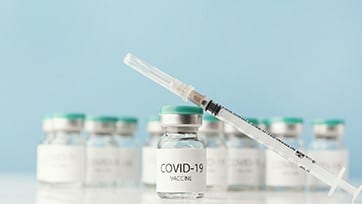Los Miembros intercambian experiencias sobre las medidas adoptadas para facilitar el comercio de bienes esenciales para combatir la COVID-19

En la tercera sesión de intercambio de experiencias organizada por el Comité de Acceso a los Mercados el 18 de julio, los Miembros de la OMC intercambiaron prácticas sobre las medidas destinadas a facilitar el comercio de bienes relacionados con la COVID-19 comprendidas en el ámbito de competencia del Comité, en particular en relación con la suspensión, la reducción o la eliminación de los aranceles. Los Miembros explicaron las diversas decisiones de política comercial que habían adoptado para garantizar que sus poblaciones y el resto del mundo pudieran acceder a productos esenciales para salvar vidas y limitar las perturbaciones del suministro y la distribución de esos bienes.
(de momento sólo en inglés)
Australia, Dominican Republic, Paraguay, New Zealand, Japan, Canada, the European Union, Uruguay, Cameroon, the United Kingdom and Norway took the floor to share their experiences and lessons learned since the pandemic outbreak in early 2020.
Presentations highlighted concrete trade measures taken in the context of the pandemic in order to ease the importation and supply of certain medical and hygiene goods central to the COVID-19 response, such as suspension of domestic duties, tariff concessions, simplification of customs procedures at ports and airports, and relaxation of import regulations and standards.
Members explained the choices underpinning these measures as well as their duration and impact. They agreed on the importance of adopting a flexible and non-prescriptive approach to the definition of goods that could have an impact on COVID-19 recovery. A concrete example was the adaptation of the domestic context to the joint World Customs Organization (WCO)-WTO Harmonized System (HS) classification list of COVID-19 medical supplies by subjecting medical and hygiene goods to zero most-favoured nation (MFN) tariffs.
The session was also the opportunity to identify the entities and sectors that could benefit from trade-easing measures, including customs officials who went through a comprehensive overhaul of their working environment, and to draw on lessons learned to do things differently in future crises.
Members recognized the importance of the work in various WTO councils and committees, such as the Committee on Agriculture, the Sanitary and Phytosanitary Measures Committee and the Trade Facilitation Committee. Moreover, members stressed the role of the rules-based multilateral trading system in underpinning the global response to the pandemic by further reducing tariffs on vaccine inputs, facilitating the smooth operation of supply chains and minimizing trading costs. Considerable progress was acknowledged but some members noted that more could be done with regards to tariffs that may still be having an impact on access, affordability and accessibility to vaccine production in some countries.
The experience-sharing session followed on from two previous sessions organized by the Committee on Market Access. The first session on 4 March addressed two main topics: the definition of lists of essential goods to fight the pandemic and challenges related to tariff classification. In the second session on 26 April, members reported on how they monitored and measured trade in essential goods to combat the pandemic and discussed ways to improve data collection at a time of crisis. In addition, they explored how to promote greater international cooperation to better track the trade flows of value chains for manufacturing essential COVID-19-related products.
As in the previous sessions, the WTO Secretariat will compile the information shared with the presentations by members. The Chair of the Committee, Kenya Uehara of Japan, recalled that the Secretariat regularly compiles and summarizes the relevant information contained in the communications notified by members with information on trade-easing measures as well as other measures by members as part of the WTO’s Trade Monitoring Exercise. The factual report by the Secretariat is circulated in document G/MA/W/168 and its revisions.
The chair thanked members for their active participation and contributions to the experience-sharing session. «Today’s session highlighted many interesting aspects and provided additional details on how members reacted during this pandemic to facilitate trade in essential goods to help combat the spread of COVID-19,» Mr Uehara said. «We have seen the reasoning behind these measures, how they were targeted and what the results have been. In addition, we have seen how these and other measures might be used for future emergencies,» he added.
As part of the topics identified by members in which the Committee could facilitate further discussions at the technical level, a fourth session will take place on 16 September. Members will discuss how to improve transparency in export restrictions as well as sharing of experiences with respect to the choices underpinning the use of such restrictions.















